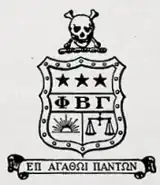| Phi Beta Gamma | |
|---|---|
| ΦΒΓ | |
 | |
| Founded | April 24, 1922 Georgetown University School of Law |
| Type | Professional |
| Affiliation | PFA (former) |
| Emphasis | Law |
| Scope | National |
| Colors | Blue and Gold |
| Publication | The Advocate Blue and Gold |
| Chapters | 0 active (7 chartered) |
| Members | 2,500 (est.) lifetime |
| Headquarters | Baltimore, Maryland United States |
Phi Beta Gamma (ΦΒΓ) was a professional fraternity in the field of law.[1][2] It was established at Georgetown University School of Law in 1922.[1]
History
Phi Beta Gamma was founded on April 24, 1922, at Georgetown University School of Law.[1][3] Its goals were to install its members with the ethics and ideals of law, to encourage the study of the technical rules of law, and to improve the facilities of law schools.[4]
Its members adopted Canons of Ethics and Rules of Conduct and secret ritualistic degrees.[5] Membership in Phi Beta Gamma was limited to male law students.[5] However, the organization also included alumni and honorary members.[6] Its officers were called chief justice, associate justice, secretary, treasurer, and bailiff.[4]
Phi Beta Gamma incorporated in Washington, D.C. as a national fraternity in April 1922.[4][5] The Beta chapter formed at the National University School of Law in 1924, followed by the Gamma chapter at the Minneapolis College of Law in 1925.[4]
Although the fraternity had a social aspect with parties, banquets, and dances, it encouraged its members to be active in campus political and social affairs and to develop relationships with faculty.[6][4] Alumni and honorary members were expected to assist collegiate members in their studies through quiz lectures and legal discussions.[6] As a result, the fraternity established a central agency to maintain a connection with alumni members. The fraternity held its first national convention in Washington, D.C. in 1924.[6] By 1950, it had six chapters and had initiated 1,600 members, making it the smallest of the law fraternities at the time.[2]
Phi Beta Gamma was a founding member of the Professional Interfraternity Conference (PIC) in 1928.[7] It was also a founding member of the Professional Fraternity Association when it formed from the merger of the PIC and Professional Panhellenic Association in 1978.[8] The fraternity was headquartered in Washington, D.C but moved to Balitmore, Maryland sometime before 1963.[1][5][6] Its original publication was called Blue and Gold.[6] Later, it published a quarterly journal called The Advocate.[1]
Symbols
Phi Beta Gamma's colors were blue and gold.[6]
The fraternity had both a badge and a watch key.in the shape of an inverted triangle thats only decoration was the Greek letters ΦΒΓ.[5] Phi Beta Gamma also had a scholarship key that was shaped like an open book bearing the fraternity's coat of arms.[5] The scholarship key was exclusively for the member with the highest grade point average in each class.[5]
Chapters
The chapters of Phi Beta Gamma were as follows; a review of campus websites shows all are dormant.
- ↑ National University School of Law merged with the George Washington University Law School in 1954.
- ↑ This school closed in 1940, in a merger with the Minnesota College of Law
- 1 2 This school, with eight other predecessor schools, would eventually coalesce into what is now the Mitchell Hamline School of Law.
- ↑ In a merger of law schools, the St. Paul College of Law became the William Mitchell College of Law in 1956. A 2015 merger created the Mitchell Hamline School of Law.
- ↑ Chapter formed from the Tulsa Law Club (local)
See also
References
- 1 2 3 4 5 6 7 8 9 10 11 12 13 14 15 16 William Raimond Baird (1991). Baird's Manual of American College Fraternities. Baird's Manual Foundation, Incorporated. pp. V-87.
- 1 2 York, Kenneth H. (1952). "Legal Fraternities". Michigan Law Review. 50 (7): 1048–1049. doi:10.2307/1284939. JSTOR 1284939 – via University of Michigan.
- ↑ Professional Fraternities by Professional Interfraternity Conference - 1950
- 1 2 3 4 5 6 The Kendallabrum. University of Tulsa. 1949.
- 1 2 3 4 5 6 7 Robson, John, ed. (1963). Baird's Manuel of American College Fraternities (17th ed.). Menasha, Wisconsin: The Collegiate Press, George Banta Company, Inc. p. 476.
- 1 2 3 4 5 6 7 8 Shepard, Francis W., ed. (1927). Baird's Manual of American College Fraternities (11th ed.). Menasha, Wisconsin: George Banta Publishing Company. p. 403 – via Google Books.
- ↑ "The ARCHI of Alpha Rho Chi" (PDF). Vol. IX, no. 7. July 31, 1928.
{{cite magazine}}: Cite magazine requires|magazine=(help) - ↑ York, Kenneth H. (1952). "Legal Fraternities" (PDF). Michigan Law Review. The Michigan Law Review Association. 50 (7): 1047–56. doi:10.2307/1284939. JSTOR 1284939. Retrieved 27 October 2021.